Top Ten Major Events in Roman History
Roman History, is in my opinion, the most fascinating history you can learn. It is filled with betrayal, power grabs, corruption, love, innovative inventions, and political, social, and cultural systems that are still used today. Roman history is diverse to say the least. This list will go over major events in Roman history. Feel free to submit an item, comment, and/or remix. Just make sure it is actually pertaining to Roman history. I really hope you enjoy, because this list took forever to research. Enjoy!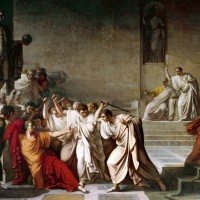
Julius Caesar's Assassination is the most infamous event in Roman History. It would set in motion a 2nd Roman Civil War in the span of a few decades and would lead to the creation of the Roman Empire and the fall of the Republic. A group of senators known as The Liberators, plotted to kill Caesar, because they believed he would bring the fall of Rome. They believed him to be corrupt and considered his Crossing of the Rubicon a power grab. They stabbed him 23 times during a Senate meeting at the Theatre of Pompey in 44 B.C. At least 60 senators were involved in the plot. This would create citizen outcry that would lead to a 2nd Civil War, the effective end of the Senate, and the rise of the Principate period. In an attempt to save the Roman Republic, the Liberators did the complete opposite and killed debatebly the best leader ever. Also a pretty good Shakespearean Play was made over the event and it has been immortalized in paintings.
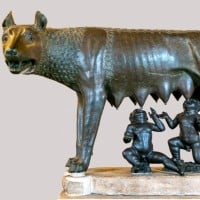
The Founding of Rome is a very popular legend in its history. According to the legend, a she-wolf raises two twin brothers found on the Tiber River. Romulus and Remus. As they grew up, they became very popular and they decided to build a city. The two disagreed on which hill to build the city and they decided to have a divine contest. Romulus won. They got into another argument about who should rule the city. It ended with Remus's death. Is the story true? Maybe. I believe some of it has to be true, but I think some of it is false. Either way it is a very popular story in Roman History.
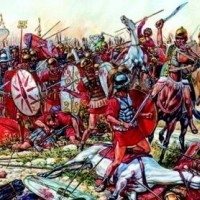
There were three civil wars in a relatively short timespan. The first was actually a chain of three mini wars, but they were all related. It included a lot of power grabs, backstabbing, and rebellion, but long story short, it ended with Sullus becoming Rome's sole leader. It inspired and made a few people famous: Pompey, Marcus Crassus, and Julius Caesar, just to name a few.
Fast forward 29 years to 59 B.C. and the First Triumvirate, an unofficial political alliance, was formed between Caesar, Pompey, and Crassus in an effort to challenge the corrupt Senate. A few years later, Crassus was killed in battle and the Senate picked Pompey to be Counsel of Rome. That made Caesar mad, and another civil war broke out. It ended with Pompey's end on a spike in 48 B.C. and Caesar being made an effective dictator.
In 44 B.C., Caesar was killed, which led to another civil war. Octavian, Marc Antony, and Lepidus then formed the Second Triumvirate for the purpose of avenging Caesar. After killing the Liberators, Octavian and Marc Antony split the Roman territory in two. Octavian controlled the west side, Antony the east. Antony got with Cleopatra, who Octavian hated, and he planned on making Alexandria the new capital. Octavian made the Senate declare war on Cleopatra. They met at the Battle of Actium. Despite being outnumbered, Octavian ran a huge propaganda campaign against Antony and demoralized him and his army. It was a huge defeat for Antony, resulting in both Antony and Cleopatra committing suicide. Octavian returned home a hero. He renamed himself Augustus Caesar and became Emperor.
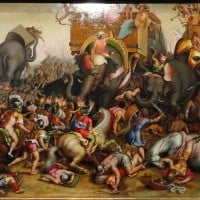
The Punic Wars were instrumental in making Rome what it became. In its earlier years, Rome was already a powerful nation. They quickly expanded. One nation stood in their way: Carthage. While Rome had a great land army, Carthage dominated the sea. Rome attempted to take Sicily, and it resulted in a huge stalemate. However, Rome eventually built up a powerful navy that Carthage could never defeat. After 23 years of exhausting war for both sides (264-241 B.C.), they signed a treaty. Carthage paid Rome, and Rome took in Sicily as a province.
In 219 B.C., Hannibal Barca sacked the Roman town of Saguntum, and Rome reacted by declaring war. Hannibal then grew a massive army and crossed the Alps, which was unheard of. Rome was shocked, and Hannibal annihilated all of Rome's soldiers sent at him. Eventually, Rome sent a full army to meet Hannibal. It was the largest army to date, but they were slaughtered at the Battle of Cannae in 216 B.C. It was one of the worst military defeats ever. Hannibal stayed in Italy salvaging off the land, but he received no reinforcements, and he could not siege a city. In 204 B.C., Hannibal was recalled when Publius Scipio invaded mainland Carthage.
In 202 B.C., Scipio and Hannibal met for the first time in the decisive battle of Zama, and Scipio defeated Hannibal. A peace treaty was then signed that made the Carthaginians pay 10,000 silver (paid over 50 years), get rid of all war elephants, limit their navy to ten warships, and give up all overseas territories. They could not go to war with any country outside of Africa, and they had to get permission from Rome to go to war in Africa. It was very harsh, but Hannibal pushed Carthage to accept. This is when Scipio gets his famous title, Africanus.
The third Punic War was straightforward. Rome wanted Carthage to be gone, so they simply besieged it and killed everyone in the city or made them slaves. That ended Carthage in 146 B.C.
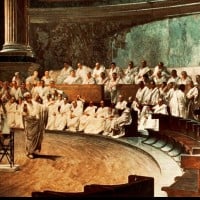
In 509 B.C., The Romans overthrew their Etruscan rulers. When they became free they established the Roman Republic. There is not a lot of writing on the exact details of how the Republic was formed. In the system, the citizens allowed to vote on representatives. In 449 B.C., The Twelve Tables was formed. These were the first laws of Rome. It was basically a list of penalities. It was very basic, but this was the first law system. It eventually evolved over time into so much more. These two ideas would be instrumental in future societies and governments like the U.S. Government.
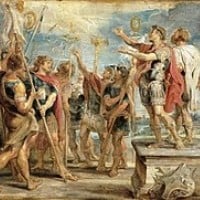
Speaking of Christians, remember when I said the persecution of Christians after the Fire of Rome would come back to bite their butts? Well yeah Christians ended up winning in the end. In 312, Emperor Constantine the Great converted to Christianity and, in 313, released the Edict of Milan which effectively ended widespread Christian Persecution. Crucifixion was also outlawed out of respect to Christianity. Ten years later, in 323, Christianity was made the Roman Empires official religion, which would change the course of Christianity forever.
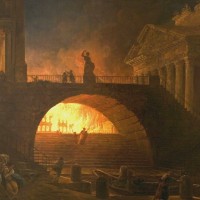
On July 19th, A.D. 64, a massive fire broke out in Rome. It was started in a merchant shop outside a chariot stadium. The fire raged out of control six days then reignited for another three days. Nero, the Roman Emperor, blamed the Christians for the fire. That led to horrible persecution of Christians. Christians were totured and some were killed. It was so bad that if you said you were a Christian you might of been executed on the spot. However this would end up biting people in the butt, but that's another story. A lot of the Historians believed Nero was the cause. He was insane. It could have just been an accident though. However two thirds of Rome burned.
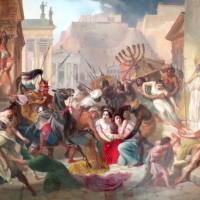
In 410 A.D. Rome was sacked for a final time by the Visigoths led by Alaric. After multiple sacks and raids, Rome had finally fallen. Of course it was still a very important city and to this day remains one of the most influential cities in the world. Rome was no longer the capital of the Roman Empire, but after this attack the whole Western side of the Roman Empire fell. The Roman Empire continued through the Byzantines, but you can make the case that they were a completely different Empire. A sad end for a once powerful empire.
If you thought The Year of Four Emperors was bad, just you wait. On New Year's Eve in 192 A.D., Emperor Commodus was assassinated while taking a bath by his wrestling partner, Narcissus. The three nobles that planned Commodus's death made Pertinax the Emperor. Pertinax did not pay the Praetorian Guard and while he tried to negotiate with them, on March 28th, they killed him. The Praetorian Guard then sold the Emperor position to the highest bidder. We then had four guys claiming to be emperor. We got Didius Julianus who paid for the position when the Praetorian offered it. He was declared illegitimate and the people thought Julianus killed Pertinax. We got Pescennius Niger who the mobs of people called for help. He was governor of Syria and brought his army to Rome, so he could become emperor. We then got Septimius Severus who claimed to be Emperor with the Senate's backing twelve days after the death of Pertinax. Pertinax was very close friends with him. And we finally got Clodius Albinus, who was offered Emperor after Commodus died, but refused. After Pertinax died, he offered to step in. So we got 4 men who all claim they are Emperor. What happens next? Well first Julianus was executed on Severus's orders on June 1st. Then Severus made Albinus honorary Emperor while he went to go fight Niger. It was a two year war that ended with Severus winning. After that Albinus and Severus declared themselves both Emperor, but Severus defeated Albinus and became sole Emperor. That began the Severan Dynasty.
Now, this is a crazy event. Sit back and get your popcorn. It all started when Praetorian Prefect Nymphidius Sabinus made a plan to become Emperor. He transferred the power of his men from Emperor Nero to Servius Galba. Nero was quickly sentenced to death and decided to commit suicide.
The following year, in 69 A.D., Galba was very unpopular. He didn't give the Praetorian Guard what they wanted. The legions in Germania refused to swear allegiance and named Vitellius Emperor. After that, Galba named a successor. I would rather not spell out the successor's name because it is very long, but just know it wasn't Marcus Otho, an influential nobleman who wanted power. Otho bribed the already unhappy Praetorian Guard, and they killed Galba in the Senate Forum along with his successor.
Otho became Emperor and was shocked to learn that Vitellius was approaching with a massive army. Otho tried to make a peace offering by proposing to marry his daughter. It was too late, and Otho was defeated at the Battle of Bedriacum. Rather than flee and counterattack, he decided to take his own life.
Vitellius threw massive feasts when he came to power, which put him in debt. He also killed citizens cruelly and assassinated rivals by inviting them to his palace with promises of power, only to kill them. Vespasian, a popular general in Egypt, was called upon by the governor of Syria and the people to become Emperor. With multiple legions, he went to Alexandria where he was acclaimed Emperor. A Danubian legion led by Marcus Primus attacked Vitellius on behalf of Vespasian. Vitellius was defeated and went into hiding. He paid one last visit to the palace where he was caught and killed by Vespasian's men.
Vespasian was then crowned Emperor by the Senate on December 21, 69 A.D. His crowning marked the beginning of a prosperous dynasty: the Flavian Dynasty. So ends the Year of the Four Emperors.
I want to thank you for looking at this list. If you really liked... more
On August 24, 79 AD, Mount Vesuvius erupted, devastating the nearby Roman coastal city of Pompeii. Excavation of the site continues to this day, which lends even more to the sad story of this doomed Roman enclave. The plaster of Paris casts derived by pouring the mixture into areas where organic matter was buried in pyro-volcanic ashe creates particularly interesting (and spooky) casts of victims in their death throes. A reliable historic accounting is far more interesting, so check it out online if you'd like.
Thanks to 2storm for his exhaustive research on the entirety of the list.
Happened in 260 AD. A major battle taking place in Edessa in which the Roman army was defeated and the emperor (Valerian) was captured by the persian forces. Over 70,000 troops were involved in the battle.
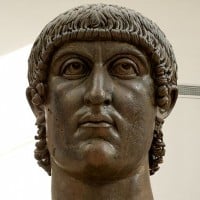
This has to do with Christian Conversion, but the Edict of Milan is officially what made Christianity the religion of the Roman Empire and ended the torture Christians had to go through.
In 378 AD, the eastern roman army led by Valens engaged in a battle against the Visigoths and lost in a retreat due to a combination of poor conditions of the roman soldiers and poor leadership. Most of the soldiers (two thirds out of approximately 15,000) were killed by their opponents along with the emperor. This would signify the beginning fall of the Roman Empire due to the incursion of the barbarians that would be anticipated in the future